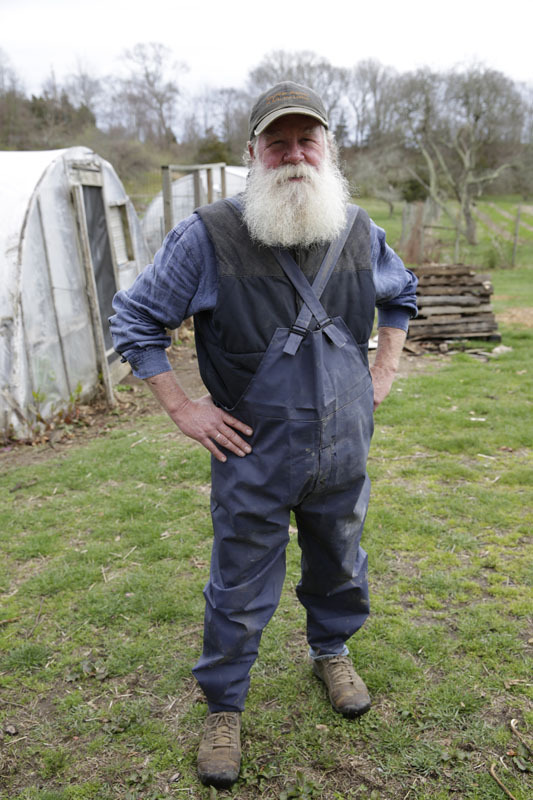
When Scott Chaskey first set about writing his third book a few years ago, he envisioned journeys across the globe. His energy was ignited by the success of a recent trip to China, which brought him in touch with farmers from 40 different countries. Their common ground was community supported agriculture (CSA), which Chaskey had been practicing for 30 years at Quail Hill Farm in Amagansett.
“I wanted to write about the trip, but I wasn’t sure how it would fit into another book,” he said.
On the heels of that journey, Chaskey was finding the universal in the disparate — even in diverse climates and cultures, a seed held the same promise. His idea was to travel more — to continue the revelations that China unveiled with farmers from all over the world.
Then the COVID-19 pandemic struck. All of Chaskey’s plans for travel across the continents halted, and the journey outward became the journey inward and the journey back. And those inward journeys, it turns out, can go farther than you ever thought possible.
“It makes me think of the John Muir quote,” Chaskey tells me, casting his eyes toward the bookshelves that line his Sag Harbor home.
“I only went out for a walk, and finally concluded to stay out till sundown, for going out I found, I was really going in,” said Muir.
So Chaskey spent the years of writing “Of Soil and Spirit” exploring the Long Pond Greenbelt behind his home. He had stepped back from his duties managing Quail Hill for the Peconic Land Trust, with the intention of spending more time writing.
“Behind our house, you can walk for over an hour in the woods,” he said. “I started to study the fungal growth in our backyard, to watch the birds. I began to understand what it means to live on the rim of two kettle holes, how it was the movement of the glacier that covered this whole landscape.”
All these observations found their way, poetically, into his book. Because that’s the way Chaskey sees the world: through a poet’s lens. Even though he became one of the heartiest farmers of the East End, he started from the perspective of a poet, and he’s always seen the land that way.
When Chaskey first moved to the East End — from the rocky cliffs of Cornwall, England — he didn’t know how deeply he would become involved with the CSA movement. A part of him always longed for his solitary writer’s desk. But as he got involved with Quail Hill, the first CSA in New York State, he relished his time working with the prized soil in Amagansett. He also relished how it led him to community building and taking a stand for something meaningful.
“That sense of purpose was something I hadn’t had as a writer of lyric poems,” he said.
Chaskey has thought a lot about the way working with the land and writing intermesh, and he hasn’t come up with a clear explanation, though he knows that they do.
“George Orwell was a great gardener,” he said. “But people know him as a savvy political writer. Still, his garden was as important to him. Writing is in a room by yourself. Working with the earth is so tangible — hands sifting through soil. You are interacting with tangible life, and that’s not the way it is with writing necessarily. I can’t describe how they intertwine, but I know they do in a very unusual way.”
As Chaskey explored the world outside his door, he also devoted chapters to places and people he had always wanted to write about. That original impetus, the trip to China, is an important part of the book. He also goes back to a journey to New Mexico, and even to a time in his 20s when he first learned to work with the Earth, farming and writing poetry in Maine.
“There’s a chapter about the teacher I had in college, Basil Bunting, who I always wanted to write about. I couldn’t travel anywhere, so I traveled widely in my study.”
He also read a lot — disproportionately about trees.
“Trees are a prominent symbol for the activity under the soil,” Chaskey said. “There can be as much biomass under the soil as above.”
At Quail Hill, he often worked in the farm shop, in the shade of a 100-year-old beech tree.
“When I started to write this book,” he said, “I looked up beech trees, and learned that the word means ‘book.’ The beech is a synonym for literature, and I had been farming under the canopy of this massive beech tree all these years.”
Ultimately, speaking to Chaskey and reading his work can’t help but give the listener a sense of hope and promise. His commitment to building up the health of the soil, to give seeds the best chance to thrive, is root work. It’s an optimist’s work.
“Farming doesn’t always revive the soil,” he said. “But there are methods you can use that do. Having done that and seeing the results, amplified by a community of people, but beginning with the soil — that’s a hopeful thing.”